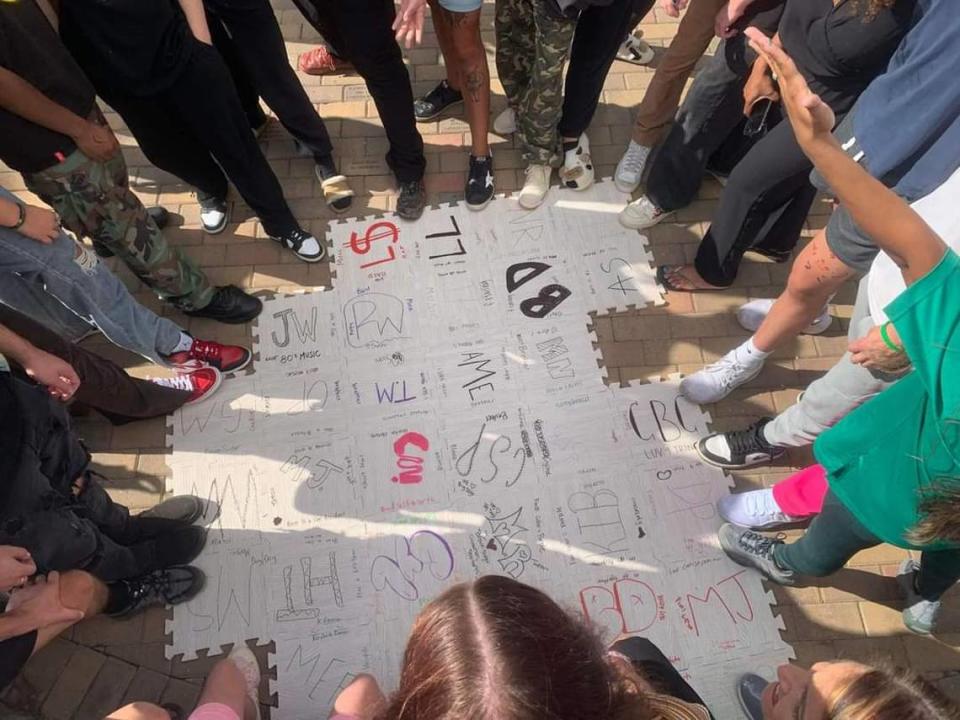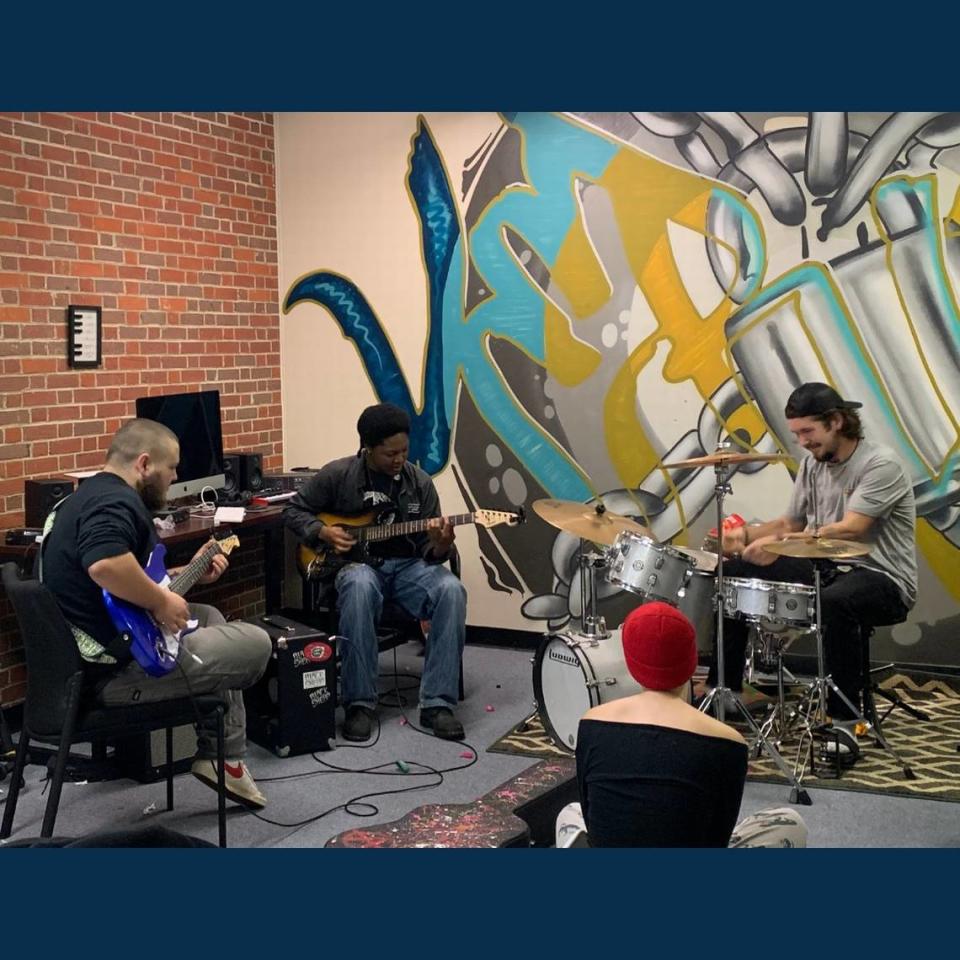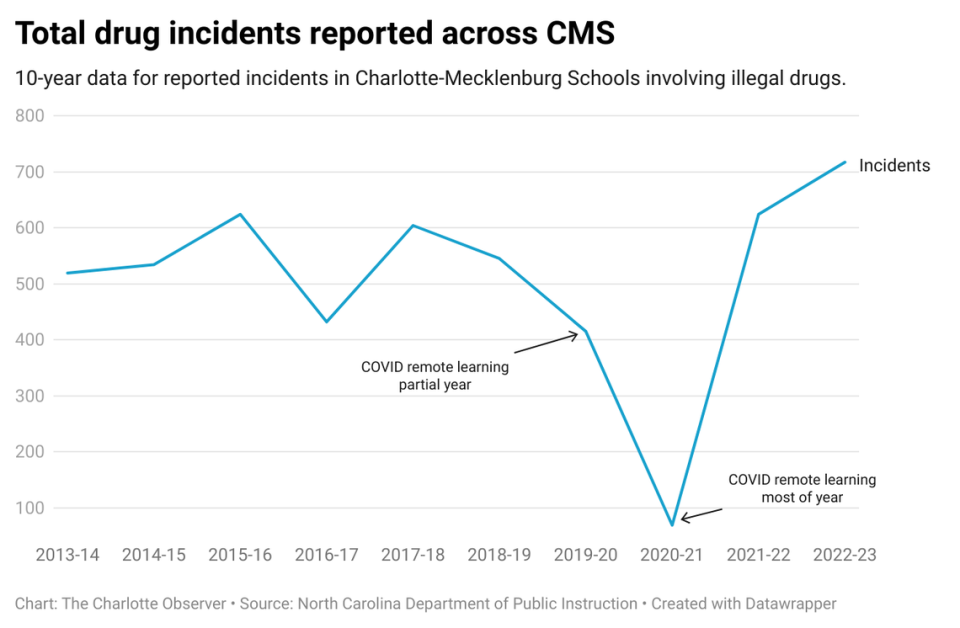‘We’re needed.’ How Charlotte recovery school’s rare accreditation will help save lives
The small school inside an east Charlotte church has never been “normal.”
Phones are dropped at the door, teachers do routine mental-health checks and talking about drugs and addiction isn’t punishable by a trip to the principal’s office. It’s encouraged.
Emerald School of Excellence — one of two recovery schools in North Carolina and about 40 in the country — now has another distinction: an accreditation from the Association of Recovery Schools.
“We’re successful because Charlotte and its neighboring communities have made it very clear we’re needed,” said Emerald’s founder and CEO Mary Ferreri.
Drugs found in local high schools reached a 10-year high during the 2022-23 year, and The Charlotte Observer’s recent series on teens and fentanyl unveiled opioid’s pervasiveness throughout the district.
The $7 pills that landed some Hough High School students in rehab and killed 17-year-old Laird Ramirez also reeled in Dylan Krebs. He left Hough and joined the 25 other students at Emerald this August. It’s one of the best things that’s ever happened to him, he said, second only to rehab.

“Previously in school, I felt hopeless, overwhelmed, and like I was never gonna go anywhere in life,” Krebs said. “Emerald allows my education to be more personalized and allows my teachers to give me more support so I can move up.”
‘Not my kid.’ How $7 pills get Charlotte teens hooked on fentanyl
Fentanyl overdose reversal spray ‘standing by’ for every public school in Charlotte
About 10 recovery schools in the U.S. have an accreditation, said Andy Finch, the co-founder and senior advisor of the Association of Recovery Schools. The association evaluates schools based on their organization, inclusive populations, recovery resources and academics, Finch said.
Ferreri said she hopes the accreditation gives a “stamp of approval” that curbs parents’ doubts and gives credibility to the school’s curriculum, and it’s values.
Mental health and addiction in teens
Emerald, which set out in 2019 to give students recovery support and a more customized path to a diploma, is among the nation’s best recovery schools because of its exceptional emphasis on mental health, Finch said.
Most other recovery schools are focused on, well, recovery. At Emerald, teachers and counselors hone in on the mental health disorders that often drive teens to first reach for drugs or alcohol.
The needs of teens recovering from substance use or mental health struggles — or a combination of the two — changes every day, Ferreri said. Emerald changes with them.

At just 11, Krebs was already struggling with festering depression and anxiety. He said it drove him down the six-year path from his first swig of alcohol to his first line of cocaine and, eventually, to an addiction to fentanyl pills.
“We have our son back,” said Brendan Krebs, Dylan Krebs’ father. “There’s still a lot of work that we have to do, but without Emerald there’s no way that he would have survived at Hough.”
Emerald is “private on paper,” Ferreri said, but donations, scholarships and grants have kept her from turning away any family looking to enroll their student.
A recent $1.2 million grant from the state — the first the school received — will go toward expanding its resources and outreach into the community, Ferreri said. It will also allow Emerald to guide Raleigh’s Wake Monarch Academy, the only other recovery school in the state and region grow toward its own accreditation.
Republican Rep. John Bradford supported the grant, as did most representatives, he said.
“With our youth, there’s clearly an issue with drug abuse, especially with the opioid crisis and fentanyl,” he said. “I thought it was important that we put some money in the program to help these folks break their addiction and get on their feet.
“I have to believe they want to be productive in society and make contributions just like everybody else. They just have to get rid of their demons, and this school seems to be a program to help them do that.”
While recovery school students across the nation are typically those with “the most profound issues,” Finch said their ripple effect can’t be understated.
“They’re just a drop in the bucket of those struggling with mental health or substance abuse,” he said. But when they heal and share with their friends — who likely face similar issues — they start to heal the rest of the community, he said.

Recovery schools, he said, typically funnel in students who would otherwise enter a rotation though “the system” — whether that’s the justice, treatment or hospital system. Because of that, they can act as a guide in resolving the mental health crisis in the U.S. and rethinking where money for addiction services — which is currently focused on adults — should go.
Teens and drugs
Last year, Charlotte-Mecklenburg Schools saw a 10-year high in the amount of drugs on campus.
Last month, police centered on young adults and teens in a campaign to slow overdose deaths and curb fentanyl trafficking.

Charlotte’s plights reflect the national epidemic. Across the country, youth overdose deaths increased more than 100% from 2019 to 2021, according to the Centers for Disease Control and Prevention. Deaths involving illicitly manufactured fentanyl increased 182% in that same time period.
Michael Durchslag, vice chair of the Association of Recovery Schools and director of the longest running recovery high school in the U.S., said places like Emerald can acts as models for effective drug education.
But they aren’t meant to be stand-alone treatment, and states shouldn’t look at the schools as a “cheap alternative.” Rather, the schools are an important resource for struggling students and a catalyst for community education and change.
Ferreri says her students — her miracles, survivors and fighters — are the real heroes.
“If teens can hear other teens talk about being and living sober and understand why that’s a beautiful thing, and not ‘lame’ or ‘uncool,’ that could change — and save — a lot of lives,” she said.
Where to look for recovery help
In the Charlotte area, Ferreri often refers families to InSight’s drug rehab program and its outpatient therapy.
The residential facilities available for teens younger than 18 are in Arizona, according to Insight’s website. But its outpatient therapy — especially when paired with outside support such as Emerald and group therapies — can be life-changing, parents said.
She also recommends treatment through the Dilworth Center, Queen City Counseling and Newport. Free sources, including Full Circle, Smart Recovery, Recovery Dharma, Celebrate Recovery, Alcoholics Anonymous and Narcotics Anonymous, are also easily accessible.
Everything is a team effort, she said, even Emerald.
“People in crisis need an actual human being helping them,” she said. “Emerald is meant to be that: a place where families and teens have a team to look to for support.”


